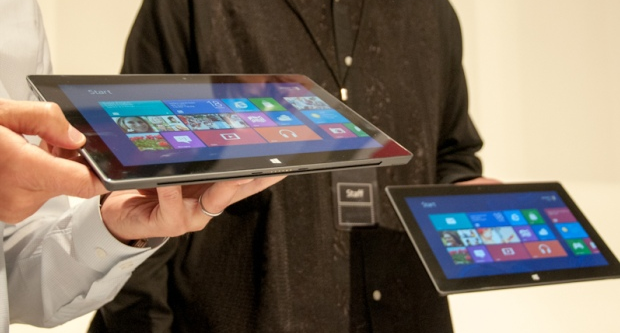Microsoft admits Surface competition risk with tablet OEMs

Buried in a filing with the U.S. Securities and Exchange Commission (SEC), Microsoft warns that it faces "intense competition across all markets" which could lead to lower revenue or pressure on its operating margin.
But its Surface tablet could cause the company a long-term headache with its friends in the hardware building space -- now its rivals in the tablet market.

On page 14 of Microsoft's 10-K annual report as required by law, the software giant warned of potential trouble ahead particularly with the impending launch of its Surface tablet.
Talking about overall competition in the technology sector, Microsoft gave the usual flags to its business, such as the need to stay ahead of the competitor curve by distributing low-cost products "broadly and quickly." It also noted innovation, something many tech companies in recent years failed to achieve (hint: Nokia, RIM; just to name two.)
But the meat of the sandwich comes with Surface.
There's no secret that the company has disrupted the tablet space in a bid to take on the iPad in the enterprise space. But it's making public progress by noting the concerns, as it rightly should.
The section on competition among platforms, ecosystems and devices, Microsoft prides itself on its "well-established ecosystem" of users, application developers, and partners that provide platforms that "accelerate growth." Microsoft adds that the impending "launch the Windows 8 operating system, Surface devices, and associated cloud-based services" adds further pressure to its existing ecosystem.
Building up to the crux, Microsoft said its operating margins face pressure from rivals that control both the hardware and software of a product or service. Apple's the most famous one with its iPhone and iPad devices, and Mac computers, but Microsoft too acts in a similar way with the Xbox and its cloud platforms.
We also offer vertically-integrated hardware and software products and services; however, our competitors have been in the market longer and in some cases have established significantly large user bases. Efforts to compete with the vertically integrated model will increase our cost of revenue and reduce our operating margins.
But Surface will cause the largest shake up in the Windows-based tablet market and could force OEMs to feel neglected and pushed out, resonating with Acers' sentiment that Microsoft's strategy to take on Apple with its surface will "fail." Dell said pretty much the same thing, despite reiterating its ongoing commitment to Microsoft and it would bring out its own slate-like device.
Here's the kicker line (emphasis mine):
We derive substantial revenue from licenses of Windows operating systems on personal computers. The proliferation of alternative devices and form factors, in particular mobile devices such as smartphones and tablet computers, creates challenges from competing software platforms. These devices compete on multiple bases including price and the perceived utility of the device and its platform. [...]
Even if many users view these devices as complementary to a personal computer, the prevalence of these devices may make it more difficult to attract applications developers to our platforms. In addition, our Surface devices will compete with products made by our OEM partners, which may affect their commitment to our platform.
Arguably, however, Microsoft chief executive Steve Ballmer said the company will "prime the pump" in kick-starting hardware partners and OEMs in bringing Windows 8 to as many platforms and device makers as possible, but in doing so has royally ruffled the feathers of its friends and extended family in the hardware space.
Despite its desire to succeed, Microsoft's tablet epitaph could read that while its Surface tablet was to show off to hardware makers its design for a Windows 8-powered tablet, it was merely a goalpost for others to overtake. Either way, Microsoft gets off lightly. It succeeds with Surface and generates vast revenue, or its hardware partners win the tablet race and Microsoft says that its own 'encouraging push' was its plan all along.
Microsoft remains quiet on a lot of things, not least pricing, despite reporting to suggest otherwise. At least the software giant isn't burying its head in the sand on the wider issues, though.
Image credit: Josh Lowensohn/CNET.